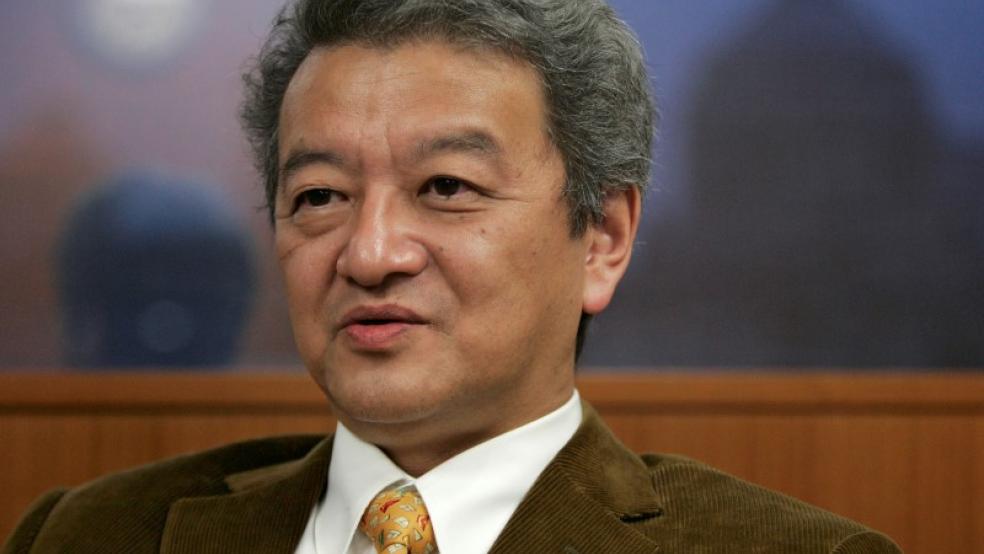For a related ANALYSIS on the future of that BOJ stimulus program.
Below are candidates to succeed Kuroda if he is not reappointed, based on a Reuters poll of economists.:ETSURO HONDA (aged 62)Before becoming Japan's ambassador to Switzerland, Honda was an adviser to Abe and known as one of the architects of Abe's masterplan to reflate the economy.A vocal advocate of aggressive monetary easing, Honda said last year the BOJ's monetary policy is already close to "helicopter money," or direct underwriting of government debt that is considered a taboo among Japanese central bankers.Honda was among those who persuaded Abe to postpone a sales tax hike, initially scheduled for April 2017, by 18 months after an earlier increase tipped the economy into recession.Appointing Honda to the top job at the BOJ could heighten the chance of Kuroda's massive monetary stimulus program staying in place, or even being expanded.HIROSHI NAKASO (64)Currently one of the BOJ's two deputy governors, Nakaso has spent most of his career at the central bank and is known as an expert on financial markets and systems.While he had supported the conventional policy approach of former governor Masaaki Shirakawa, Nakaso came out in favor of a more aggressive easing during Kuroda's term in office.He is considered as among those on the board most keen to seek an exit from ultra-loose monetary policy, given his experience as a career central banker ending the BOJ's previous spell of quantitative easing in 2006.His deep knowledge of the BOJ's interactions with markets and his connections overseas make him a safe pair of hands should the BOJ withdraw stimulus.MASAYOSHI AMAMIYA (62)Another career central banker, Amamiya oversees the BOJ's monetary policy drafting, and is known for masterminding most of the bank's innovative policy measures - including its huge asset-buying program and yield curve control.His ability to communicate with Japan's demanding lawmakers and ability to craft ingenious solutions to the BOJ's many problems earned his approach the nickname "Amamiya magic".Choosing Amamiya would heighten the chance that Kuroda's stimulus policies would be continued, though he is also known for his flexibility in responding to changes in the political and economic environment.TAKATOSHI ITO (67)Currently a professor at Columbia University, Ito has spoken favorably of Abe's economic policies and led a panel that created the blueprint for the government's plan to push Japan's public pension fund to invest in riskier assets.Ito is among the most well-known Japanese academics globally, having done stints at the International Monetary Fund and Japan's Ministry of Finance, when he worked under Kuroda who was then Japan's leading currency diplomat.Ito has been an advocate of inflation targeting long before the BOJ set a 2 percent target in 2013, and would likely ensure the bank's stimulus program is sustained if appointed.In recent speeches and commentaries, Ito has said the BOJ may hike its long-term interest rate target if Japanese market rates rise in tandem with U.S. Treasury yields, but that the BOJ should not rush in scaling back its huge balance sheet.NOBUCHIKA MORI (60)As outspoken head of Japan's financial regulator, Mori has stunned the country's conservative banking sector by blasting regional banks, for delaying reforms to boost lending, and the asset management industry, for imposing high fees on investors.A dark-horse candidate, little is known about Mori's views on monetary policy, though he has warned against overly relying on monetary policy to reflate Japan's economy.Mori's experience in financial regulation makes him well placed to manage risks to the banking sector caused by prolonged monetary easing, and his strong-hand approach in making big organizational changes at his agency has won him the trust of some top executives at Abe's administration.But his lack of experience on monetary, fiscal or currency diplomacy makes him a less likely choice, analysts say. (Reporting by Stanley White and Leika Kihara; Editing by Ian Geoghegan)Factbox: Potential candidates for next BOJ governor

MICHAEL CARONNA



